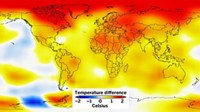Advertisement
Grab your lab coat. Let's get started
Welcome!
Welcome!
Create an account below to get 6 C&EN articles per month, receive newsletters and more - all free.
It seems this is your first time logging in online. Please enter the following information to continue.
As an ACS member you automatically get access to this site. All we need is few more details to create your reading experience.
Not you? Sign in with a different account.
Not you? Sign in with a different account.
ERROR 1
ERROR 1
ERROR 2
ERROR 2
ERROR 2
ERROR 2
ERROR 2
Password and Confirm password must match.
If you have an ACS member number, please enter it here so we can link this account to your membership. (optional)
ERROR 2
ACS values your privacy. By submitting your information, you are gaining access to C&EN and subscribing to our weekly newsletter. We use the information you provide to make your reading experience better, and we will never sell your data to third party members.
Environment
Extreme Weather Tied To Human Activity
Temperature data analysis, independent of climate models, indicates human activity is exacerbating heat waves and droughts
by Stephen K. Ritter
August 13, 2012
| A version of this story appeared in
Volume 90, Issue 33
Recent heat waves, droughts, and increasingly longer summers would likely not be happening without global warming caused by human-induced release of greenhouse gases, according to scientists at NASA’s Goddard Institute for Space Studies (Proc. Natl. Acad. Sci. USA, DOI: 10.1073/pnas.1205276109). Climate scientists have been hesitant to link extreme weather events, such as the heat wave and drought in Texas and Oklahoma in 2011, to human-induced climate change rather than chalking them up to natural climate variability, in particular when the analysis is based on theory and climate-change computational models. NASA’s James E. Hansen and colleagues have now used only temperature data to compare weather anomalies during a base period of 1951–80 with anomalies since 1980. They found that extremely hot summers—those with temperatures three standard deviations greater than the mean temperature during the base period—affected less than 1% of Earth’s land surface during the base period. But these extreme events now affect 10% of the land. The researchers say their results are important to help form public policy, because actions to sufficiently curb greenhouse gas emissions are unlikely until the public, which typically takes its cues from local variability in weather, perceives that human-caused global climate change is under way.




Join the conversation
Contact the reporter
Submit a Letter to the Editor for publication
Engage with us on Twitter